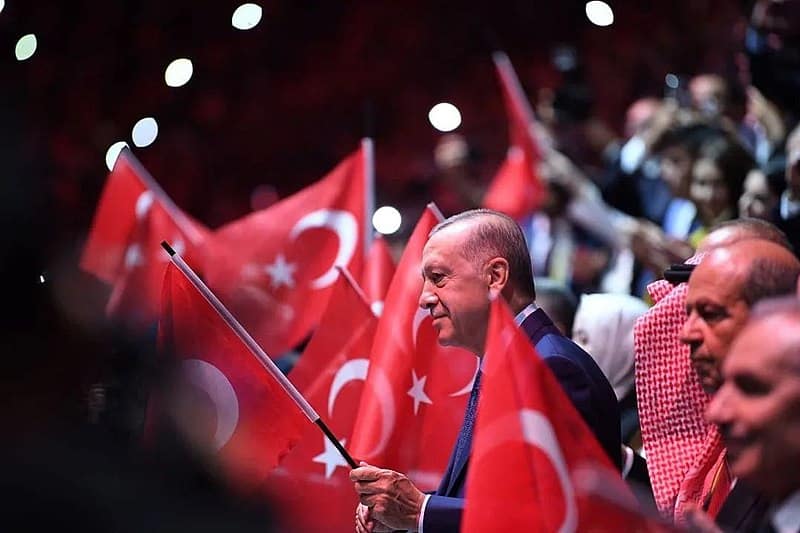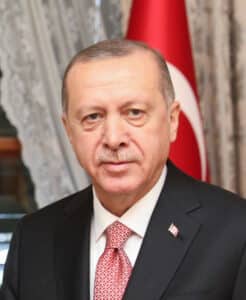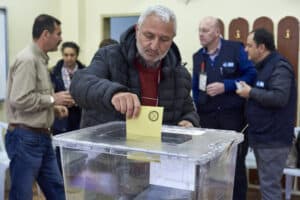Recep Tayyip Erdogan: 2022
On Sunday, 14 May, general elections took place in Türkiye with current President Tayyip Erdogan and his biggest opponent, Kemal Kilicdaroglu both not securing an absolute majority in the presidential elections. It is the tightest race in Türkiye’s history since Erdogan first took power over two decades ago, resulting in a run-off presidential election on 28 May, as nobody received 50% of the votes In the Presidential elections, Erdogan received 49,51% of the vote, just short of reaching the required majority to secure a win in the first round. His main rival, Kemal Kilicdaroglu, came in second at 44.88%, according to the country´s electoral authority. Sinan Ogan, the third presidential candidate, finished third at 5.17%.
Erdogan edges the opposition in Turkey’s parliament
Parliamentary elections took also place. The overall parliamentary result indicates a victory for a range of nationalist parties, and an unexpected loss for the six-party coalition headed by Kilicdaroglu, who expected to secure a majority. In preliminary results from the parliamentary elections, Erdogan’s People Alliance has secured 49.38%, resulting in 316 seats in parliament, while the National Alliance, the opposition coalition has 35.16% and 213 seats, with potentially 10 percentage points if adding votes from the Kurdish-majority People’s Democratic party, which ran under the Green Left party. The seat allocation method in Turkish parliaments provide a majority for Erdogan’s alliance, as he secures more than half of the parliament’s 600 seats. The share of the parliamentary vote for Erdogan’s AKP party has shrunk substantially from prior legislative elections. Analysts say that gives Erdogan an edge in the presidential runoff because voters may not want different factions running the executive and legislative branches. This is what Erdogan emphasized in his speech: “We have no doubt that the preference of our nation, which gave the majority in parliament to the People’s Alliance, will be in favour of trust and stability in the second round”.
Kilicdaroglu responded to the disappointing result “We will definitely win these elections in the second round. Erdogan didn’t win the vote of confidence he was expecting. In the next 15 days we will fight for rights, laws and justice in this country.” Erdogan said that he accepts the run-off and will win it. He added “The winner has undoubtedly been our country today”. In provinces with a predominantly Kurdish population, Kilicdaroglu maintained a lead over Erdogan. In Kahramanmaras, the epicentre of the earthquake in February, voting results showed surprisingly more than 71 percent of the votes had gone to Erdogan. Erdogan received the majority of the votes in the conservative region central Anatolia and Kilicdaroglu scored good in the coastal region and the main cities.
Sinan Ogan as kingmaker
In the upcoming run-off, Erdogan clearly has the momentum after winning 49.5% in the first round, relying on his conservative and nationalist voter-base. But Sinan Ogan’s support in the run-off will be crucial as he received 5,17% of the votes, which are enough to swing the vote in favour of one of the candidates. Both Erdogan and Kilicdaroglu will both be courting support from Sinan Ogan.
Political science professor at Koc University in Istanbul, Murat Somer, said that Ogan is critical of both Erdogan and Kilicdaroglu, but that the majority of his voters are closer to Erdogan than to Kilicdaroglu. He further added “Kilicdaroglu needs to explain how he can stably govern with an AKP-controlled parliament”. Sinan Ogan said he could only support Kilicdaroglu in the runoff if he agrees to offer no concessions to a pro-Kurdish party. He said “We will consult with our voter base for our decision in the runoff. But we already made clear that the fight against terrorism and sending refugees back are our red lines”. However, Ogan had built his presidential campaign on the promises of sending refugees back to their countries and return to more orthodox economic policies, which Kilicdaroglu also emphasized in his campaign.
Fair elections?
Early on Monday, Kilicdaroglu accused Erdogan’s party of interfering with the counting and reporting of the results. He said that Erdogan’s party was “destroying the will of Türkiye” by objecting to the counts of more than 1,000 ballot boxes in Ankara and Istanbul. Sinan Ogan also said he had heard of overseas votes being manipulated. “Vote counting is not done in a healthy environment. I warn the Supreme Election Council. Take the necessary measures immediately and ensure that the vote counting processes are carried out quickly”. He did not give evidence for his claims. The opposition also accused news agency Anadolu of manipulating the timing of its results, claiming that it always shows an early lead for the AK Party ad delaying voting figures for regions where opposition is strong. According to Nate Schenkkan of Freedom House, Erdogan uses this to set the narrative and demoralise the opposition. A delegation from the Organization for Security and Cooperation in Europe (OSCE), expressed concerns over the unfair advantage enjoyed by President Erdogan and the ruling parties in Türkiye, attributing to unequal campaigning conditions. Head of the ODIHR election observation mission, Jan Peterson said “I regret to note that the election administration’s work was lacking in transparency, as well as the overwhelming bias of the public media and the limitations to freedom of speech”.
The Turkish lira fell against the euro as investors voiced disappointment that Erdogan’s era of unconventional economics does not appear to be coming to an immediate end. The 28 May second round of presidential elections will allow Türkiye to decide if the nation remains under the increasingly authoritarian president for a third decade, or if it will go on a more democratic route that Kilicdaroglu claims to deliver.
Author: Manouk Bronzwaer



